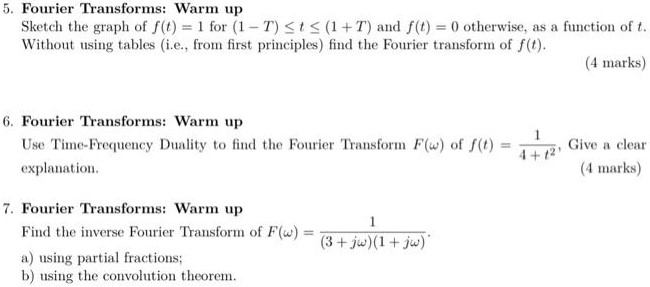Fourier Transforms: Warm up Sketch the graph of f(t) = 1 for (1−T) ≤ t ≤ (1+T) and f(t) = 0 otherwise, as a function of t. Without using tables (i. e. , from first principles) find the Fourier transform of f(t). (4 marks)Fourier Transforms: Warm up Use Time-Frequency Duality to find the Fourier Transform F(ω) of f(t) = 14+t2, Give a clear explanation. (4 marks)Fourier Transforms: Warm up Find the inverse Fourier Transform of F(ω) = 1 (3+jω)(1+jω). a) using partial fractions; b) using the convolution theorem.
